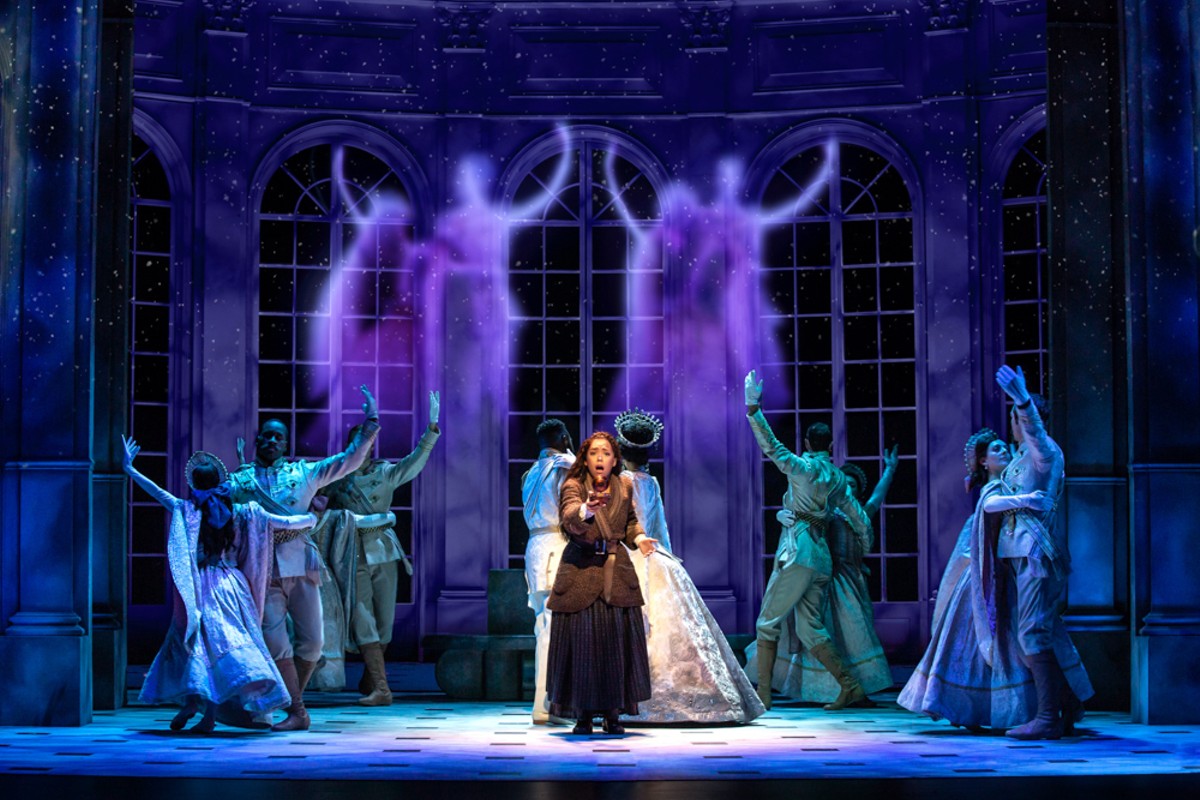Everyone in “Anastasia” has something to remember, even if they don’t want to. One character wants to remember her own identity; another wants to forget the violence that upended her life. Exiled Russian aristocrats want to remember their days of luxury; one man wants to bring back the joys of an affair. Another man turns a traumatic childhood memory into a source of pride, then seeks out the opportunity to recreate it.
For all its emphasis on memory and reliving the past, the touring production of the musical “Anastasia,” which is playing at Whitney Hall now through Sunday, sometimes struggles with it. The show certainly hearkens back to the good old pre-pandemic past of grand musicals and theater-going, not to mention the grandeur of aristocratic Russia and 1920s Paris, but some of its other elements struggle to survive beyond the stage.
After a brief prologue set in 1906, the show begins in Russia in 1917, when 17-year-old Grand Duchess Anastasia Nikolaevna Romanova, part of the Romanov ruling family, is seemingly killed alongside her family and courtiers as the Russian Revolution seizes the palace.
After the revolution, Anya (Kyla Stone), a young amnesiac street sweeper, is working when she hears rumors that one of the princesses may have survived the siege. She meets streetwise Dmitry (Sam McLellan) and former aristocrat-scammer Vlad (Bryan Seastrom), two down-on-their luck opportunists who both desperately want to leave Russia and flee to Paris. They see Anya as their ticket out, someone they can train, à la Henry Higgins, into an impostor believable enough to fool the real Anastasia’s grandmother, the heartsick Dowager Empress (Gerri Weagraff), and her lady-in-waiting, Countess Lily (Madeline Raube.) If they succeed, they figure, they’ll collect a comfortable fortune from the reward money. Meanwhile, Gleb (Ben Edquist), a hard-laced Soviet officer who rises through the ranks in the new party, pursues Anya, trying to figure out if she’s the real deal — and, if so, to finish what his father, a royal guard turned royal executioner, started. (It’s a fortunate coincidence for the show that the Communist color is also the same as theater’s traditional villain color, making it easy to signal the party’s presence with harsh red lighting.)
While all the acting and singing was solid, I noted two particular standouts: Kyla Stone (Anya) has a fabulous, belty voice that surpasses that of her Broadway predecessor, Christy Altomare; Ben Edquist (Gleb) puts his operatic background to excellent use.
Weirdly, though, there is one way that memorability fails in this production: the songs themselves. As I walked through the parking garage after the show, I struggled to think of any songs I remembered well enough to car-sing on the way home. I could only think of two: “Once Upon a December” and “Journey to the Past,” the latter of which is featured in the tour’s trailer.
Beyond those, though, nothing else was “sticky” enough to be memorable, not like those in other shows PNC is sponsoring this season — “Fiddler on the Roof,” for example, or “Annie.”
I don’t think it was because I’d never seen the original animated “Anastasia” that the stage show is largely based on; I think it was just that the melodies weren’t strong enough to live on their own. It’s a painful irony for the show — the plot is all about a struggle to remember, and I struggled to remember the music, the show’s core, itself.
The sets (by Alexander Dodge) were simple enough to make a touring production manageable; that is, there weren’t layers and layers of lush palatial furniture and physical set dressing, but much of the background came from digital screens that created snowy windows, moving maps, Bolshevik silhouettes, a famous Parisian bridge and whatever else the script required.
Still, there was a problem in the last 20 minutes or so at Wednesday night’s performance: from my almost-aisle seat in the “grand tier,” Whitney Hall’s middle level, I could see an upper section of the screen “blink” several times, noticeable enough to be annoying, like feeling an armrest you can’t fully use. It’s possible that no one else noticed, though there was also a brief tech delay earlier in the show from which the cast rebounded nicely.
The show was serious and lighthearted in turns, though the humor never drew upon anachronism, avoiding one of my least favorite traps into which so many modern shows otherwise fall. But there was a joke about an American princess pretender — “At least that little imposter from Cleveland paid her own way. What is Cleveland? I’ve never heard of such a place. Sounds dreadful.” — that got plenty of laughs. A bawdy comic relief song between two characters did, too. Yet, as Ben Brantley’s New York Times review of the original production noted, the shifts in tone were awkward at times: “[B]loody periods of history, like the Russian Revolution, do not naturally lend themselves to perky song and dance. [...] [The plot] segues from the execution of the Russian royal family to plucky comic numbers about hard times in the newborn Soviet Union. No, the death-dealing firing squad doesn’t sing.”
But I don’t want to take away from one thing that was personally significant about the show: this was my first time seeing any musical theater since early 2020. That’s not a small thing — I used to make my living in it for nearly a decade; although my job title at LEO is “staff photographer/reporter,” my background is more in theater photography than photojournalism.
But since theater went “on pause” for close to two years, I’d since replaced its role in my life with live music, especially punk shows. But those, generally speaking, are participatory. Even at Belushi Speed Ball shows, which are theater unto themselves, you still have to participate because you yourself are part of the show.
I had forgotten, though, how nice it is to be at a show where other people do all the work for you, somewhere where you can feel the squish of velvet seats and the silky paper of a program, where you can watch for actors making small Easter-egg character choices, where people dress up, and how much I missed it all — and that, really, is what the experience of seeing “Anastasia” is about. Despite its flaws, the touring production is still a good representation of why people see musicals at all: it’s got soaring vocals, colorful scenic designs, period costumes, handsome leads, romantic tensions and the spectacle of a bygone era. It is an indulgence, and it is a solid musical.
But maybe the reason “Journey to the Past” stuck with me wasn’t just that it has a nice melody — maybe it was because I recognized in its lyrics something that spoke to my own experience with theater. Like Anya, who remembers and rediscovers clues to her own identity as the show goes on, I, too, got to remember last night that this, the musical theater experience, was once my identity, my life. I missed everything about live theater, but I know how much the industry has hurt since it shut down. Anastasia may not have been able to return to palace life as she once knew it, nor might I likely ever return to a fully pre-COVID theatergoing life, but, as Anya sings: “Let this be a sign / Let this road be mine / Let it lead me to my past / And bring me home / At last!”
Anastasia runs at Whitney Hall daily through Sunday, August 7. The show has a runtime of 2 hours and 25 minutes with one 15-minute intermission. The show contains some flashing lights, theatrical haze, and loud noises. You can buy tickets and find accessibility information at this link.
Keep Louisville interesting and support LEO Weekly by subscribing to our newsletter here. In return, you’ll receive news with an edge and the latest on where to eat, drink and hang out in Derby City.
Follow us on Facebook, Twitter and Instagram.







